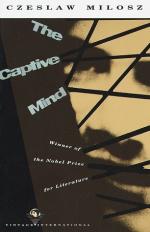
|
| Name: _________________________ | Period: ___________________ |
This test consists of 15 multiple choice questions and 5 short answer questions.
Multiple Choice Questions
1. When Delta's writing no longer pleased the party, what happened?
(a) He was forced to print only in underground papers.
(b) Publishers were instructed to print only the work that showed he had reformed.
(c) Publishers were instructed not to print his work.
(d) He was exiled to Siberia for three years in a labor camp.
2. When do Beta's stories show that people are good?
(a) Only when it directly benefits them.
(b) When life has meaning.
(c) Only while acting within civilization.
(d) Inherently.
3. According to Chapter 8, how does communism define the reactionary?
(a) Refuses to agree wholeheartedly with the party.
(b) Is incapable of seeing how everything is interdependent.
(c) Reverts to the traditional way of thinking.
(d) Acts contrary to party principles.
4. Because he believed in earthly salvation, what did Beta argue?
(a) Promises of heavenly salvation are false.
(b) History has no force in man's present struggles.
(c) Anyone opposing mankind's happiness is evil.
(d) Only man can bring about his own happiness.
5. Apart from his poetry, what was Delta's personality?
(a) Sly and gloomy.
(b) Sly and fearful.
(c) Optimistic and cheerful.
(d) Completely deceitful.
6. Chapter 6 opens with a picture of Vilna, which is a city of __________ .
(a) Beaches.
(b) Streams.
(c) Forests.
(d) Gardens.
7. How can the relationship between Gamma and the author be described?
(a) An acquaintanceship.
(b) A deep friendship.
(c) A love affair.
(d) A game.
8. When he spent time in Moscow, what kinds of reports did Delta send back?
(a) Ones that spoke haltingly of Russian progress.
(b) Ones that said exactly what the party wanted to hear.
(c) Ones that portrayed the city as gloomy.
(d) Ones that glowed with enthusiasm.
9. When someone asked about his family and origins, how would Delta answer?
(a) Fall silent.
(b) Tell a different story every time.
(c) Answer questions about his town but not about his family.
(d) Go into great detail about his hometown.
10. How did Gamma express his anti-Semitic views?
(a) Calmly.
(b) To anyone who would listen.
(c) Violently.
(d) Only to the people he trusted.
11. As the Polish fought the Germans for control of Warsaw near the end of the war, how did a few people manage to survive?
(a) Hiding in the surrounding forests.
(b) Swimming across the river.
(c) Hiding with the underground resistance.
(d) Turning themselves in as prisoners of war.
12. As he got older, how did Gamma feel about his life?
(a) He had not devoted enough energy to the party.
(b) He had wasted his youth in service of the party.
(c) He had wasted his youth on reckless living.
(d) He had become too comfortable with his accomplishments.
13. What kind of mentality do peasants have, according to the state?
(a) Middle-class.
(b) Unrealistic.
(c) Low-class.
(d) Feudalist.
14. As Beta scornfully realized, how could someone have power in Poland?
(a) Follow the procedures established by the Polish government.
(b) Destroy all Polish underground resistance.
(c) Overcome the Nazis.
(d) Seize it by force.
15. In Russia, what organization did Gamma and several of his friends create?
(a) The Union of Patriots.
(b) The Society of Enlightened Communist Workers.
(c) The Society for the Well-Being of Mankind.
(d) The Union of Workers.
Short Answer Questions
1. When man is faced with constant death and when life seems meaningless, how does dialectical materialism seem?
2. What did Delta, in his enthusiasm, love?
3. In light of Beta's poetry, how does Milosz treat the modern artist's potential?
4. Often when Milosz sees women walking through the streets of Paris, what does he remember?
5. What view of Poland's past did Delta's poetry present?
|
This section contains 654 words (approx. 3 pages at 300 words per page) |

|




